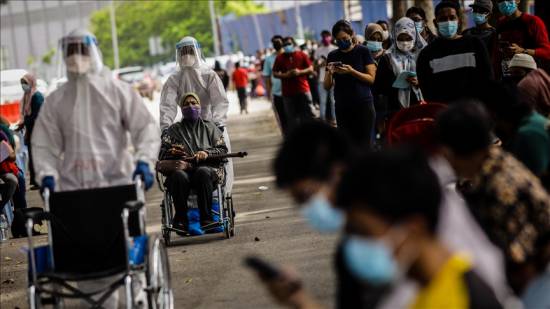The fate of Malaysia’s new government will be determined by Prime Minister Ismail Sabri Yaakob’s leadership in handling the ongoing coronavirus pandemic and economic crisis, according to experts.
Azmi Hassan, a political expert at the University of Technology Malaysia, noted that the next 100 days will be critical for the new government in fighting COVID-19.
During the inauguration of the new Cabinet last week, Ismail urged the ministers to prove their capabilities in 100 days.
"If the situation does not change much within 100 days, criticism towards the new government will be unavoidable,” said Hassan.
Critical days ahead
The failure of former Prime Minister Muhyiddin Yassin’s administration in controlling the pandemic was because they relied too much on advice from authorities, especially in the health sector, without considering the suffering of the people, according to Hassan.
The new government, however, is different from its predecessor, he said.
“Prime Minister Ismail Sabri prefers to watch the situation closely and directly. He also knows how to express what he wants. That is why he asked each minister to show their best efforts within 100 days,” he added.
The expert is also optimistic that the new Cabinet will handle the crisis better, although most of them are “old faces.”
Last week, Malaysian opposition leader Anwar Ibrahim criticized the prime minister for retaining ministers from the previous government.
In his speech, Anwar stressed that the country is facing both a health and economic crisis due to the worsening COVID-19 situation.
“The country is facing a dire COVID-19 crisis and the economic problems are putting pressure on the people, especially those in the bottom 40% (lower-income) group. But the step taken was to reshuffle ministers who do not show the ability to deal with these issues effectively,” said Anwar.
Malaysia continues to log a high number of COVID-19 cases as the Delta variant continues to ravage the country.
To date, the country’s total number of infections has exceeded 1.76 million, including nearly 17,000 deaths, while it has administered 34 million doses of COVID-19 vaccines so far, with 46% of the 32 million population fully vaccinated.
Challenges of economic recovery
In his address to the nation in commemorating the 64th anniversary of the country's Independence Day, Sabri highlighted that Malaysia faced many challenges to achieve independence and build itself afterwards.
“The challenge that we are facing today has never been experienced by leaders and previous governments. Now we are faced with several simultaneous challenges, namely disease outbreaks and economic turmoil. But I hope we will not lose hope,” he said Monday night.
He urged Malaysians to get vaccinated immediately to help the country recover from COVID-19 as well as stressing that vaccines have been shown to have a positive impact on combating the pandemic.
“This success will pave the way for economic recovery in this country and allow us to live in the new normal. The economy should be restored, the well-being of the people should be improved, and investor confidence should return,” he added.
Based on the latest data from the Department of Statistics Malaysia DOSM, the country's gross domestic product (GDP) expanded by 16.1% year-on-year in the second quarter of 2021.
Also, the unemployment rate in Malaysia climbed to 4.8% in June, involving 768,700 people, the DOSM reported. The number rose from 4.5% in May with 728,100 unemployed.
Sudarnoto Abdul Hakim, a political expert from the State Islamic University of Syarif Hidayatullah, Jakarta, said the economic recovery was a major challenge for the new government under Sabri’s leadership.
Although Malaysia announced an economic stimulus package worth 250 billion ringgit ($60 billion) last year, the crisis has had a ripple effect in the country.
“If the new government fails to handle the COVID-19 crisis, it is possible that they will face the same fate as Muhyiddin Yassin’s government,” Hakim told Anadolu Agency.
In mid-August, the Malaysian ringgit fell to a one-year low, and stocks in Kuala Lumpur slipped as Yassin handed his letter of resignation to the king.
Political union
The return of the United Malays National Organization Party to power is also at stake, the expert said.
The new government should be more inclusive by embracing the opposition and civil society groups amid dire times, added Hakim.
“The initial plan of Prime Minister Ismail Sabri was to involve the opposition in handling the pandemic as well as economic and political turmoil at least until 2023. But the idea was eventually called off,” he said.
In a statement issued Tuesday on the occasion of Malaysia’s 64th National Day celebrations, the King of Malaysia advised people to maintain unity and harmony by putting aside their differences in opinion and political disputes “so that a strong symbiosis can be created among all to pull the country out of the pandemic.”/aa


